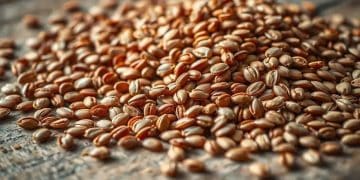Flax seeds health benefits of incorporating them daily

Flax seeds offer numerous health benefits, including improved heart health, enhanced digestion, and weight management, thanks to their high content of omega-3 fatty acids, fiber, and antioxidants.
Flax seeds health benefits are becoming more recognized as people seek natural ways to enhance their nutrition. Have you considered how these tiny seeds can make a big difference in your health? Let’s dive into their potential perks.
Nutritional profile of flax seeds
The nutritional profile of flax seeds is impressive and beneficial for overall health. Packed with essential nutrients, these tiny seeds are a powerhouse of nutrition. They are rich in omega-3 fatty acids, which are known to support heart health and reduce inflammation.
Vitamins and Minerals
Flax seeds contain several important vitamins and minerals. They provide:
- Vitamin B1 (Thiamine) – essential for energy metabolism.
- Magnesium – important for muscle function and bone health.
- Phosphorus – aids in the formation of bones and teeth.
- Manganese – supports metabolism and bone health.
In addition to vitamins and minerals, flax seeds are also an excellent source of dietary fiber. This fiber supports healthy digestion and can help you feel full longer.
Omega-3 Fatty Acids
The omega-3 fatty acids found in flax seeds, specifically alpha-linolenic acid (ALA), play a crucial role in heart health. Regular consumption of these seeds can help lower cholesterol levels and reduce the risk of heart disease. Including flax seeds in your diet can also support brain function and enhance mental clarity.
These little seeds are versatile and can easily be added to various dishes. For example, you can sprinkle them on salads or blend them into smoothies. Their nutty flavor complements many meals, making them an easy addition to your diet.
Protein Content
Flax seeds are also a great source of plant-based protein. Just two tablespoons provide around 3 grams of protein, making them an excellent choice for vegetarians and vegans. This protein helps to build and repair tissues and supports overall health.
As you can see, the nutritional profile of flax seeds demonstrates why they are often regarded as a superfood. With their wide range of health benefits, incorporating them into your daily routine can lead to improved well-being.
How flax seeds improve heart health

Flax seeds have a variety of properties that can significantly enhance heart health. By incorporating these small seeds into your diet, you can support your cardiovascular system in multiple ways. Their wealth of beneficial nutrients works together to promote a healthier heart.
Rich in Omega-3 Fatty Acids
The primary reason flax seeds are known for improving heart health is their high content of omega-3 fatty acids. These essential fats are crucial for reducing inflammation, which is a major factor in heart disease. ALA, or alpha-linolenic acid, found in flax seeds, has been shown to help lower bad cholesterol levels.
- Lowering total cholesterol
- Reducing triglycerides
- Decreasing blood pressure
With regular consumption, flax seeds can aid in maintaining overall cardiovascular health, leading to a more resilient heart.
Fiber for Heart Health
Another critical component of flax seeds is dietary fiber. This fiber helps regulate cholesterol levels, as it binds to cholesterol in the digestive system and aids in its elimination. By doing so, it can help lower the risk of heart-related issues. The fiber in flax seeds also promotes healthy digestion, further supporting overall health.
Moreover, consuming fiber-rich foods like flax seeds can keep you feeling full longer, which may prevent overeating and contribute to weight management—an essential factor in reducing heart disease risk.
Antioxidant Properties
Flax seeds also contain powerful antioxidants, such as lignans, which are known to be beneficial for heart health. These compounds can help reduce oxidative stress and inflammation, two significant contributors to heart problems. By incorporating flax seeds into your diet, you can enhance your body’s defense against heart disease.
Adding these seeds to your meals is as simple as sprinkling them on yogurt, mixing them into smoothies, or incorporating them into baked goods. Their subtle, nutty flavor will complement various dishes, making it easy to reaping their heart health benefits.
Flax seeds and digestive benefits
Flax seeds offer remarkable digestive benefits, making them a great addition to your daily diet. These tiny seeds are packed with dietsry fiber, a vital component for maintaining healthy digestion.
High Fiber Content
Flax seeds contain both soluble and insoluble fiber. Soluble fiber absorbs water and forms a gel-like substance, slowing down digestion and helping to regulate blood sugar levels. Insoluble fiber adds bulk to your stool, making it easier to pass.
- Improves bowel regularity
- Reduces the risk of constipation
- Aids in maintaining a healthy gut microbiome
The combination of these fibers in flax seeds can help prevent digestive issues like bloating and constipation. By including these seeds in your meals, you’ll not only help your digestive system but also feel fuller for longer.
Promoting Gut Health
In addition to their fiber content, flax seeds are a great source of omega-3 fatty acids, which have anti-inflammatory properties. This can benefit your gut health, leading to improved digestion overall. A healthier gut may help in nutrient absorption and lessen digestive discomfort.
Simply incorporating flax seeds into your smoothies, yogurt, or salads can enhance gut health. The seeds can also be ground to make them easier to digest, making them a versatile ingredient in various recipes.
Natural Laxative Effect
The high fiber content in flax seeds also provides a natural laxative effect, aiding those who suffer from occasional constipation. When consumed with plenty of water, flax seeds can help to soften stools and promote regular bowel movements.
Adding these seeds to your diet is easy and beneficial. Whether you mix them into baked goods or sprinkle them on cereals, flax seeds can make a positive impact on your digestive health.
Tips for adding flax seeds to your diet

Adding flax seeds to your diet can be simple and enjoyable. These nutritious seeds can enhance your meals while providing many health benefits. Here are some practical tips to easily incorporate them into your daily routine.
Start with Ground Flax Seeds
Using ground flax seeds makes them easier to digest and helps your body absorb their nutrients better. You can buy them pre-ground or grind them at home using a coffee grinder. Ground flax seeds can be added to various foods without altering their taste.
Mix into Smoothies
One of the easiest ways to enjoy flax seeds is by adding them to your smoothies. Simply blend a tablespoon of ground flax seeds with your favorite fruits and vegetables. It adds a nutty flavor and boosts the nutritional value.
- Add to breakfast smoothies for an energy boost.
- Combine with yogurt and fruits for a healthy snack.
- Mix into protein shakes post-workout.
This quick addition can help kickstart your day with extra fiber and omega-3s.
Sneak them into Baked Goods
Flax seeds can be a great addition to your baking recipes. You can replace some of the flour in recipes for muffins, pancakes, or bread with ground flax seeds. This will not only improve the nutritional content but also add moisture to your baked goods.
Consider using flax eggs as a substitute for regular eggs in vegan recipes. Mix one tablespoon of ground flax seeds with three tablespoons of water and let it sit for a few minutes. This creates a gel-like mixture that works well in baking.
Top Your Salads and Dishes
Another easy way to add flax seeds is by sprinkling them on top of your salads or main dishes. They can enhance the flavor and provide a satisfying crunch. Adding flax seeds to your meals not only boosts nutrition but also keeps you feeling full longer.
By following these tips, incorporating flax seeds into your diet can be delightful and rewarding. Explore various recipes and ingredients to see how these seeds can transform your meals.
Incorporating flax seeds into your diet is simple and beneficial for your health. With their high fiber content, omega-3 fatty acids, and antioxidant properties, these tiny seeds can greatly enhance your cardiovascular and digestive health. Whether you choose to sprinkle them on salads, blend them into smoothies, or bake them into your favorite recipes, there are countless ways to enjoy their nutritional benefits. By following the tips for adding flax seeds to your meals, you’ll not only improve your overall well-being but also discover new flavors and textures in your cooking. Start today and experience the positive impact of flax seeds on your health!
FAQ – Frequently Asked Questions about Flax Seeds and Their Benefits
What are the health benefits of flax seeds?
Flax seeds are rich in omega-3 fatty acids, fiber, and antioxidants, which can improve heart health, aid digestion, and reduce inflammation.
How can I add flax seeds to my diet?
You can add flax seeds to smoothies, yogurt, baked goods, or sprinkle them on salads for a nutrient boost.
Should I use whole or ground flax seeds?
Ground flax seeds are easier to digest and are recommended for better nutrient absorption.
Can flax seeds help with weight management?
Yes, the high fiber content in flax seeds can promote a feeling of fullness, helping control appetite and support weight management.





